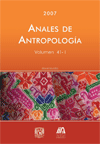Práctica complementaria en salud y recuperación del conocimiento tradicional mapuche
Main Article Content
Abstract
This article analyzes the experience of rural Makewe Hospital, located in the South of Chile, which applies a complementary health attention, integrating the knowledge and traditional resources of the Mapuche society with the western scientific knowledge and therapies. Through interviews applied to patients and health workers of the Hospital, it is sought to understand the meanings of the health/illness process built by these actors. The ethnic identity recuperation process is described as an individual, familiar and interethnic transformation, allowing the reliving of the Mapuche social threading and its symbolic weaving, which permit a traditional healing practice legitimated by the language. The value of the complementary health practice is related to the satisfaction of the demand of quality in health attention, emphasizing the role of patient as an active agent, who has valid health/illness knowledge. The health complementary practice is called upon because of: the natural remedy perceived 144 Andrea Álvarez Díaz limitations, the distrust on traditional medicine, and the opportunity given to free election between medical systems. Tensions are evidenced in the appropriation of the complementary practice by the health workers, depending on whether the emphasis is put on the improvement of health attention access, or on the strengthening of the Mapuche traditional knowledge.
Downloads
Download data is not yet available.
Article Details
How to Cite
Álvarez Díaz, A. (2009). Práctica complementaria en salud y recuperación del conocimiento tradicional mapuche. Annals of Anthropology, 41(1). https://doi.org/10.22201/iia.24486221e.2007.1.365
Citas en Dimensions Service
Esta revista usa una licencia CC del tipo CC BY-NC-ND 3.0. Se maneja bajo el esquema de acceso abierto, con una licencia Creative Commons Attribution-NonCommercial-NoDerivs 3.0 Unported.
